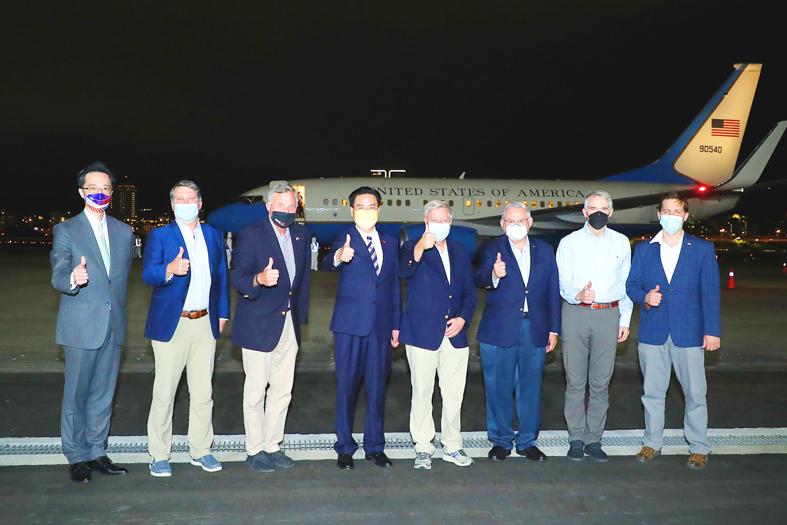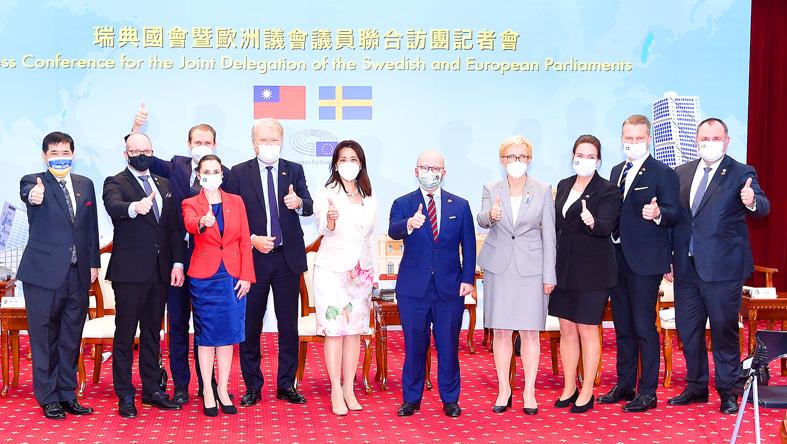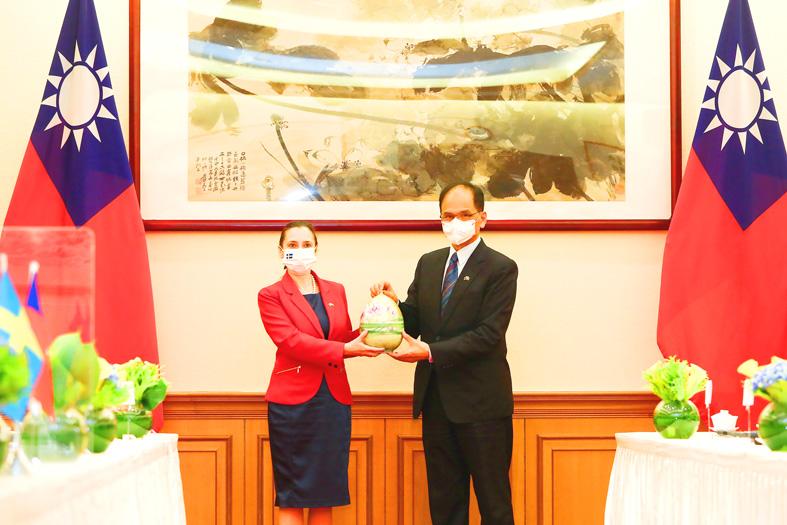A delegation of six high-ranking US lawmakers yesterday arrived in Taipei for a one-day visit as part of their Asia tour.
US Senator Lindsey Graham, who is ranking member of the US Senate Budget Committee, is leading the delegation, which also includes US Senate Foreign Relations Committee Chairman Robert Menendez, a Democrat, and Republican senators Richard Burr, Ben Sasse and Rob Portman.
Republican Representative Ronny Jackson is the only US House of Representatives member on the visit.

Photo courtesy of the Ministry of Foreign Affairs
Burr is ranking member of the Senate Health, Education, Labor and Pensions Committee, while Portman is ranking member of the Senate Homeland Security Committee.
The group touched down at 7:40pm at Taipei International Airport (Songshan airport) on a US military aircraft, where they were received by Minister of Foreign Affairs Joseph Wu (吳釗燮), the Ministry of Foreign Affairs said in a news release welcoming the visitors.
Before departing today, they are to meet with President Tsai Ing-wen (蔡英文) and Minister of National Defense Chiu Kuo-cheng (邱國正) to “exchange views on various important issues related to Taiwan-US relations,” the ministry said.

Photo: Liao Chen-huei, Taipei Times
They are also to attend a banquet organized by Wu, it said.
This is the first US congressional delegation to visit Taiwan this year, after a trip reportedly planned by House Speaker Nancy Pelosi this week was canceled after she tested positive for COVID-19.
The group is on an Asia tour as US lawmakers gradually resume international travel after years of COVID-19 pandemic restrictions.

Photo: CNA
Graham took the initiative to include Taiwan on the itinerary to “demonstrate the high regard and firm support US lawmakers from both parties have for Taiwan,” the ministry said.
Also yesterday, a visiting Swedish and European parliamentary delegation held a news conference in Taipei before their scheduled departure in the evening.
The representatives emphasized their unified support for Taiwan, despite representing a vast coalition of parties.
The visit was to send a signal of support from Europe to Taiwan, and to make sure “such signal is heard all across the Taiwan Strait,” Member of the European Parliament Charlie Weimers said.
“We want to let Beijing know that, over in Europe, we know Taiwan and care for Taiwan,” Weimers said.
Swedish Parliament Deputy Speaker Kerstin Lundgren said she was warned by Beijing not to visit, but added that the message only proved the need to support Taiwan.
Lundgren said that her chamber would soon debate changing the name of Sweden’s representation in Taiwan in an effort to “scale up” the office.
Currently named the “Swedish Trade and Invest Council,” the parliamentarians next week would debate renaming the office “House of Sweden,” which is also the name for the country’s embassy in Washington.
The change would show that the entity promotes other bilateral links besides just business, Lundgren said.
Legislative Speaker You Si-kun (游錫堃) also met with the Swedish and European delegation earlier in the day to thank them for their support.
Additional reporting by CNA

DAREDEVIL: Honnold said it had always been a dream of his to climb Taipei 101, while a Netflix producer said the skyscraper was ‘a real icon of this country’ US climber Alex Honnold yesterday took on Taiwan’s tallest building, becoming the first person to scale Taipei 101 without a rope, harness or safety net. Hundreds of spectators gathered at the base of the 101-story skyscraper to watch Honnold, 40, embark on his daredevil feat, which was also broadcast live on Netflix. Dressed in a red T-shirt and yellow custom-made climbing shoes, Honnold swiftly moved up the southeast face of the glass and steel building. At one point, he stepped onto a platform midway up to wave down at fans and onlookers who were taking photos. People watching from inside

A Vietnamese migrant worker yesterday won NT$12 million (US$379,627) on a Lunar New Year scratch card in Kaohsiung as part of Taiwan Lottery Co’s (台灣彩券) “NT$12 Million Grand Fortune” (1200萬大吉利) game. The man was the first top-prize winner of the new game launched on Jan. 6 to mark the Lunar New Year. Three Vietnamese migrant workers visited a Taiwan Lottery shop on Xinyue Street in Kaohsiung’s Gangshan District (崗山), a store representative said. The player bought multiple tickets and, after winning nothing, held the final lottery ticket in one hand and rubbed the store’s statue of the Maitreya Buddha’s belly with the other,

‘NATO-PLUS’: ‘Our strategic partners in the Indo-Pacific are facing increasing aggression by the Chinese Communist Party,’ US Representative Rob Wittman said The US House of Representatives on Monday released its version of the Consolidated Appropriations Act, which includes US$1.15 billion to support security cooperation with Taiwan. The omnibus act, covering US$1.2 trillion of spending, allocates US$1 billion for the Taiwan Security Cooperation Initiative, as well as US$150 million for the replacement of defense articles and reimbursement of defense services provided to Taiwan. The fund allocations were based on the US National Defense Authorization Act for fiscal 2026 that was passed by the US Congress last month and authorized up to US$1 billion to the US Defense Security Cooperation Agency in support of the

HIGH-TECH DEAL: Chipmakers that expand in the US would be able to import up to 2.5 times their new capacity with no extra tariffs during an approved construction period Taiwan aims to build a “democratic” high-tech supply chain with the US and form a strategic artificial intelligence (AI) partnership under the new tariffs deal it sealed with Washington last week, Taipei’s top negotiator in the talks said yesterday. US President Donald Trump has pushed Taiwan, a major producer of semiconductors which runs a large trade surplus with the US, to invest more in the US, specifically in chips that power AI. Under the terms of the long-negotiated deal, chipmakers such as Taiwan Semiconductor Manufacturing Co (TSMC, 台積電) that expand US production would incur a lower tariff on semiconductors or related manufacturing